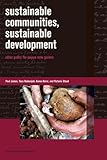Sustainable Communities, Sustainable Development : Other Paths for Papua New Guinea / Karen Haive, Victoria C. Stead, Yaso Nadarajah, Paul James.
Material type: TextSeries: Writing Past ColonialismPublisher: Honolulu : University of Hawaii Press, [2012]Copyright date: ©2012Description: 1 online resource (504 p.) : 38 b&w imagesContent type:
TextSeries: Writing Past ColonialismPublisher: Honolulu : University of Hawaii Press, [2012]Copyright date: ©2012Description: 1 online resource (504 p.) : 38 b&w imagesContent type: - 9780824835880
- 9780824861209
- 338.9953/07 23
- online - DeGruyter
- Issued also in print.
| Item type | Current library | Call number | URL | Status | Notes | Barcode | |
|---|---|---|---|---|---|---|---|
 eBook
eBook
|
Biblioteca "Angelicum" Pont. Univ. S.Tommaso d'Aquino Nuvola online | online - DeGruyter (Browse shelf(Opens below)) | Online access | Not for loan (Accesso limitato) | Accesso per gli utenti autorizzati / Access for authorized users | (dgr)9780824861209 |
Frontmatter -- Contents -- Note on Authors -- Preface and Acknowledgments -- I. Communities in Context -- II. Communities in Place -- III. Community Development -- IV. Community Learning -- Appendix: Project Partnerships and Coordination -- Bibliography -- Index
restricted access online access with authorization star
http://purl.org/coar/access_right/c_16ec
Papua New Guinea is going through a crisis: A concentration on conventional approaches to development, including an unsustainable reliance on mining, forestry, and foreign aid, has contributed to the country's slow decline since independence in 1975. Sustainable Communities, Sustainable Development attempts to address problems and gaps in the literature on development and develop a new qualitative conception of community sustainability informed by substantial and innovative research in Papua New Guinea. In this context, sustainability is conceived in terms that include not just practices tied to economic development. It also informs questions of wellbeing and social integration, community-building, social support, and infrastructure renewal. In short, the concern with sustainability here entails undertaking an analysis of how communities are sustained through time, how they cohere and change, rather than being constrained within discourses and models of development. From another angle, this project presents an account of community sustainability detached from instrumental concerns with economic development.Contributors address questions such as: What are the stories and histories through which people respond to their nation's development? What is the everyday social environment of groups living in highly diverse areas (migrant settlements, urban villages, remote communities)? They seek to contribute to a creative and dynamic grass-roots response to the demands of everyday life and local-global pressures. While the overdeveloped world faces an intersecting crisis created by global climate change and financial instability, Papua New Guinea, with all its difficulties, still has the basis for responding to this manifold predicament. Its secret lies in what has been seen as its weakness: underdeveloped economies and communities, where people still maintain sustainable relations to each other and the natural world.
Issued also in print.
Mode of access: Internet via World Wide Web.
In English.
Description based on online resource; title from PDF title page (publisher's Web site, viewed 02. Mrz 2022)


